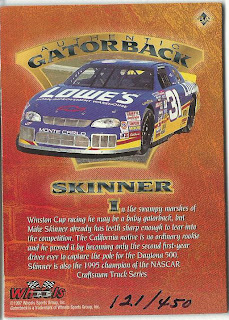In the mid-90s the world of sports cards began to change;
printing presses were being slowed down, high energy and wild designs were
being tamed and fringe card companies were either shuttering or being bought
out by the bigger companies. Companies were also looking to go outside the box,
something more was needed to grab the attention of potential customers.
Believe it or not the
most profound change came from two companies producing NASCAR cards, Wheels
Racing and Press Pass, when they introduced collectors to the memorabilia card
in 1996. Little did they realize they would ignite a revolution. A year later
Upper Deck became the first major card company to jump on board the memorabilia
train when they inserted three limited edition jersey relic cards in their 1997
Upper Deck baseball release, Ken Griffey Jr., Tony Gwynn and Rey Ordonez were
the first baseball players included on a relic card insert checklist.
But before there was jersey swatches and bat relics there
were fire suits and wheel rubber swatches. Wheels Racing even went further outside of
the box when they used animal skins, which did not go over well with animal
lovers. They only made three different inserts in 1996 and 1997 before they
ended the experiment. I have finally gotten my hand on the third insert to
complete my set.
In 1996 Wheels Racing released the Diamondback Authentic
insert. There were actually two versions; one showed each driver with a
fabricated skin the other showed the driver with real Western Diamondback skin.
Cards were a horizontal landscape card; I actually like the card design better
than the 1997 versions. They used a Western Diamondback relic, with the racer
to one side and the skin to the other side. The card is foiled and in the
background in an image of a race car. The back includes a snake related
description and at the bottom right corner was a printed #/749, mine is
#541/749.
In 1997 Wheels went beyond the Diamondback cards.
They still had the Diamondback Authentic series but the cards were now horizontal
with the driver above the rattler’s scales. The background is a high energy, colorful etched foil board. For some reason these cards were
not serial numbered.
The next animal used in 1997 was the American Alligator.
Like the Diamondback cards there were two Gatorback versions, a real skin and a
fabricated skin. The design uses the horizontal design similar to the
Diamondback 1996 layout with the driver on one side and the gator skin on the
other. The cards were foiled and the background looked like gator skin, there
were cards made using back scales and stomach skin, mine is a stomach skin
version so it is smoother. The back of the card had a swamp related message and
hand written serial numbers, mine is #121/450.
The final animal used was the Great White Shark. The cards
are horizontal, foil and have a water theme. There is only one version of these
cards; they all have a real shark tooth. The tooth is embedded in the surface;
you can actually touch the tooth. I have seen white teeth and dark colored
teeth, mine is a white tooth. The back of the card includes a water related
message and the serial number is both hand written and printed. My card is
#190/500. This Sterling Martin card was the final addition to my animal set.
Wheels Racing continued to release sets for another decade
before finally being taken over by Press Pass a couple of years ago but they
were done using animal relics for their cards. They did continue to use animal
names for some inserts but went with what has become the traditional inserts in
racing sets like fire suits, race wheel rubber, sheet metal, flags, etc.
If you are interested in picking up either a real
Diamondback or Gatorback cards make sure that the checklist number has correct
numbering with the “A” added. The added “A” stands for “Authentic”, which was
the designation for the real skin. Some sellers have posted the cards as
“Diamondback Authentic” or “Gatorback Authentic”, because that is the sets
name, but they do not state that the card has the fabricated skin. These cards are also prone to chipping because of the foil board fronts.









These are very interesting. I remember pulling my first Press Pass jersey card of Ray Allen in 1996... it's one of my favorite cards in my collection.
ReplyDeleteWow didn't know that! :D great article ... but was has a driver in common with a diamondback ?
ReplyDeleteThe only thing that I can think of that would connect drivers and a snake is the idea of drivers slipping and sliding while driving, serpentining.
ReplyDelete